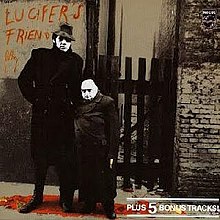| Lucifer's Friend | ||||
|---|---|---|---|---|
 | ||||
| Studio album by | ||||
| Released | January 1971 [1] | |||
| Recorded | November 1970 [1] | |||
| Studio | Tonstudio Maschen & Windrose-Dumont Time Studio [1] | |||
| Genre | ||||
| Length | 41:12 (Original LP), 53:02 (with bonus tracks) | |||
| Label | Germany: Philips (original release) Repertoire (1990 reissue) Vertigo (2010 reissue) US: Billingsgate | |||
| Producer | Herbert Hildebrandt | |||
| Lucifer's Friend chronology | ||||
| ||||
| Review scores | |
|---|---|
| Source | Rating |
| Allmusic | |
Lucifer's Friend is the first studio album by the hard rock band Lucifer's Friend, released in 1971. [1]